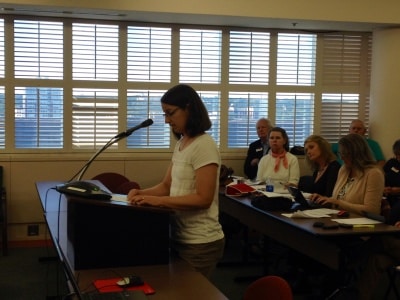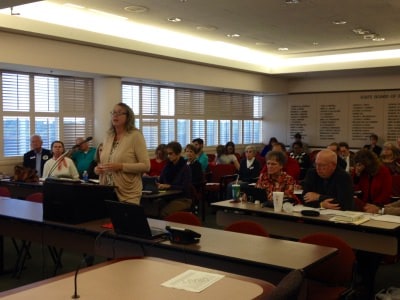
After more than a year, a state-mandated review of North Carolina’s highly divisive Common Core curriculum is in its final stages. This past Monday marked the third-to-last meeting for the politically appointed commission charged with overhauling the math and English Language Arts standards now in their fourth year.
But despite what some Common Core critics might want, the lessons being taught in classrooms won’t change overnight. It might take years.
That timeline depends on how sweeping the rewrite is, said Bill Cobey, chairman of the State Board of Education. Major changes to the standards would require professional development for teachers and a realignment of student assessments to match the new curriculum, added Vanessa Jeter, a spokeswoman for the Department of Public Instruction.
And that’s if there are changes. The future of the Common Core isn’t yet clear; there are still a large number of educators — as well as state Superintendent June Atkinson — who support keeping it in place.
The wide-ranging review of the Common Core was mandated under legislation passed in 2014 that created the Academic Standards Review Commission and tasked it with completing recommendations for revisions by this December. Tammy Covil, a New Hanover County Board of Education member and co-chair of the Commission, said that “the deadline is well within reach.”
But even after the Commission puts out its final recommendations, it won’t be the group actually writing them.
Instead, the report will propose a framework for what they might look like, said Andre Peek, an IBM executive who serves as the other co-chair. Once the Commission completes its work, the report will be sent to the legislature and the State Board.
The Board, which holds authority over most academic matters in North Carolina schools, will vote on the report — a path that will involve consideration by a sub-committee as well as the full Board, Cobey said. That process could take several monthly meetings.
And the Board could ignore the Commission’s recommendations. Rep. Larry Pittman (R-Cabarrus) spoke at Monday’s meeting, saying that he wrote the original legislation responsible for creating the Commission and that it got watered down during the legislative process to the point where the State Board isn’t bound in any way to heed the Commission’s recommendations. He said his original bill was stronger.
“There would have been a much more vigorous working between the Commission and the State Board of Education,” he said.
But Cobey said he didn’t think the Board would disregard the work of the Commission. He expected that Department of Public Instruction staff, who are doing a simultaneous review of the Common Core, would come up with many of the same suggestions as the Commission on clarity and simplicity.
Depending on the extent of revisions needed, Cobey said the Board would then either task department staff with a rewrite or hire an outside consultant to do it, if such a process involved more extensive work.
The timetable for implementation could become a point of tension among education officials, the Board, and lawmakers. A number of General Assembly members, including Pittman, have expressed consistent frustration with the Common Core and want a replacement ready as soon as possible.
“I would just like to, for the record, say that in my original legislation it would have been done by now,” Pittman told the Commission Monday.
In an email, Pittman said he would like to see Common Core gone by next fall, though he added that he didn’t “have a crystal ball.”
But implementation of any kind in 2016-17 might not be feasible, Covil said.
“I know that from the outside looking in, they want to see change very quickly. But we don’t want to fall into that trap that created the problem in the first place,” she said, citing what she saw as the rushed implementation of the Common Core. She expected the Commission to recommend a phase-in of any new standards.
The public comments
The Commission is currently gathering feedback from educators across the state on their preliminary recommendations, unveiled in August. And it heard from some members of the public on Monday.

Elizabeth Berg is a retired teacher of 35 years and implored the Commission to get rid of the standards.
“My entire purpose in being here is to say: We need to remove Common Core,” she said.
She was particularly critical about the loss of handwriting in schools, saying it’s essential to the learning process.
“The hand trains the brain,” she said. “You make a four and pretty soon you know what a four is.”
Jennifer Schrand said her children are suffering under Common Core, both academically and emotionally.
“Common Core took away her love of school, and her confidence,” she said of her daughter, who she eventually chose to homeschool.
Andrea Dillon, author of the Lady Liberty 1885 blog where she often writes critically about

the Common Core, attacked the standards’ emphasis on utilizing multiple strategies for solving math problems, rather than letting students use the one that works best for them. She said her son has a natural aptitude for math, but he struggles with the curriculum under the Common Core standards.
“Once he got in there, especially 1st and 2nd grade, these strategies started to hinder his ability to understand,” she said, adding later, “He was basically starting to think that he was the problem.”
One supporter of Common Core spoke to the Commission Monday: Ned McMillan, a retired elementary teacher and adjunct professor of math. He said wholesale change would be confusing for students and parents.
“It’s going to encourage more parents to leave public education,” he said.
He recommended modifying the current standards rather than replacing them. One thing he thinks could be improved is to have more emphasis on problem solving in schools.
“I think it’s so important regardless of what standards we do adopt,” he said.
Details remain murky
There doesn’t yet appear to be consensus within the Commission on the future of the Common Core.
Covil believed the Common Core standards “as a whole” were on their way out of the state’s schools, she said. There were positive aspects of the standards, she said, but “there are so many recommendations that we will be making, it will require a significant amount of change.”
Peek, on the other hand, stopped short of declaring an end to the Common Core. The Commission members had spoken with education leaders in other states, he noted, and almost all of them were conducting similar reviews – regardless of whether they supported Common Core as a national effort.
“There’s still a bone of contention,” he said, about whether “the standards are flawed, or is it the implementation that’s flawed? Then the question is, can these standards continue to be rolled out effectively?”
Still, the Commission’s work has offered a sense of how its priorities are shaping up. The draft recommendations reflect a desire to give teachers more flexibility in writing lesson plans and to move some requirements to different grade levels.
Several members have also emphasized that improving clarity around the state’s curriculum is essential, given the spate of complaints from teachers and parents about not understanding the current standards.
Terry Stoops, director of education studies at the John Locke Foundation, said the Commission had not expressed much desire to keep the math curriculum, which aims to emphasize problem-solving and real-world application instead of rote memorization. The Commission subgroup that focused on math suggests returning to the previous Algebra I-Geometry-Algebra II sequence in high schools. Stoops thought a strong possibility for replacement standards would be the Minnesota’s math standards, which is not wordy or confusing, he said. The Commission’s math subgroup did, in fact, endorse those standards for K-8 math.
In April, Triangle High Five, a regional consortium of five public school districts in the Research Triangle area (Chapel Hill-Carrboro City Schools and Durham, Johnston, Orange and Wake County Public Schools), wrote a letter to the Commission expressing their collective strong support for the Common Core State Standards for Mathematics.
On English, “it’s really hard to read where they’re at,” Stoops said. The draft recommendations outline complaints about students no longer reading for pleasure and about the lack of writing assessments. Rewriting those standards, though, Stoops said, “would be quite an undertaking.”
One outside presentation made to the commission in June — dubbed the “North Carolina Plan” — suggested an overhaul of the “confusing and illogical” Common Core, including a drastic refocusing of the English curriculum on literature, instead of nonfiction. A grassroots coalition called the North Carolina Academic Freedom Alliance led the effort.
Prior to Monday’s meeting, Covil said she didn’t expect the proposal to play a major role in the group’s final report. Her chief concern was the lack of evidence or data included with the plan.
But at Monday’s meeting, Gerald Egolf, development lead for The North Carolina Plan and member of the Alliance, pushed the proposal again, saying that his group had revised it in response to the Commission’s preliminary recommendations.
“Version 2.2 is now, I would say and others agree, stronger than either the Minnesota or Massachusetts standards,” he said.
For Covil, the ultimate goal of the Commission process is to focus on “what is in the best interest of students.” While it may not be entirely clear yet what is going to happen with the state’s standards, she said she “would like to see some change happening.”
But Carrie Tulbert, principal of Concord Middle School and North Carolina’s 2014-15 principal of the year, said she would rather let the Common Core play out in schools for a few more years. “I do not feel like we have enough data at this time to merit changes with fidelity,” said Tulbert — who spoke at the Commission’s September meeting — in an email.
She felt that “those complaining about the standards are not the majority of our teachers. They know the standards better than anyone else. THEY,” she wrote with added emphasis, “should be the ones making the decision.”
Recommended reading



